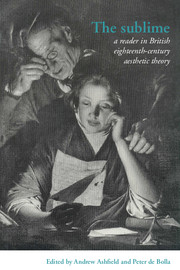Book contents
- Frontmatter
- Contents
- List of Abbreviations
- Introduction
- Part I The Longinian tradition
- Part II Rhapsody to rhetoric
- Part III Irish Perspectives
- Part IV The Aberdonian Enlightenment
- 28 An enquiry into the life and writings of Homer (1735)
- 29 Theodorus: a dialogue concerning the art of preaching (1752)
- 30 An essay on taste (1759)
- 31 An essay on original genius (1767)
- 32 Essays on the intellectual powers of man (1785)
- 33 Dissertations moral and critical (1783)
- Part V Edinburgh and Glasgow
- Part VI From the Picturesque to the Political
- Sources and further reading
28 - An enquiry into the life and writings of Homer (1735)
Published online by Cambridge University Press: 05 June 2012
- Frontmatter
- Contents
- List of Abbreviations
- Introduction
- Part I The Longinian tradition
- Part II Rhapsody to rhetoric
- Part III Irish Perspectives
- Part IV The Aberdonian Enlightenment
- 28 An enquiry into the life and writings of Homer (1735)
- 29 Theodorus: a dialogue concerning the art of preaching (1752)
- 30 An essay on taste (1759)
- 31 An essay on original genius (1767)
- 32 Essays on the intellectual powers of man (1785)
- 33 Dissertations moral and critical (1783)
- Part V Edinburgh and Glasgow
- Part VI From the Picturesque to the Political
- Sources and further reading
Summary
Section II
… In the second or third age of this period was Homer born; that is, at a time when he might, as he grew up, be a spectator of all the various situations of the human race; might observe them in great calamities, and in high felicity; but more generally they were increasing in wealth and discipline. For, my lord, I cannot help observing, that from these hard beginnings, and jarring interests, the Greeks became early masters of the military art, and, by degrees, of all others that tend to enrich or adorn a city, and raise a commonwealth: shipping and commerce, domestic order, and foreign influence, with every subservient art of policy and government, were invented, or improved; and some of them brought to a very great degree of perfection.
And truly it could not be otherwise, while each city was independent, rivalling its neighbour, and trying its genius in peace, and its strength in war. Upon good or bad success, the citizens, all concerned in the administration, made a careful enquiry into the cause of it. What fault in their conduct had procured the one, or what excellency in their constitution the other? This liberty produced hardiness and discipline; which at length arose to that height, that ten thousand Greeks were an overmatch for the Persian monarch, with all the power of the Asiatic plains.
This, my lord, happened long after; but the struggle was fresh in Homer's days: arms were in repute, and force decided possession.
- Type
- Chapter
- Information
- The SublimeA Reader in British Eighteenth-Century Aesthetic Theory, pp. 163 - 165Publisher: Cambridge University PressPrint publication year: 1996
- 1
- Cited by



